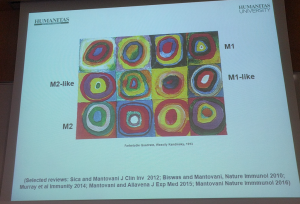
- This event has passed.
Alberto Mantovani (Humanitas, Milan), Inflammation, immunity and cancer
23 November 2017 | 14 h 00 min - 15 h 30 min

Alberto Mantovani
Humanitas Clinical and Research Center; Humanitas University, Rozzano (Milan), Italy
Inflammation, Immunity and Cancer:
From Bench to Bedside

Abstract:
Paul Erhlich is a founding father of modern Medicine and Immunology with his amazing foresight of antibodies. He and other founding fathers were observing the tools of immunology, such as antiserum therapy developed by Kitasano and Behring here in Germany, changing the course of dreadful diseases such as difteria. They dreamed of using the tools of immunity to fight cancer. Thus, generations of physicians and scientists have dreamed of using the power of our immune system to fight cancer, prompted by the key contribution that vaccinology and immunology have given to double our life expectancy in less than a century. Efforts along this line lead to what I would consider no more than proof of principle clinical evidence, a lot of frustration and widespread skepticism among oncologists. In the last 16 years we have witnessed a change in the accepted paradigm of the essence of cancer, crystallized once more by Hanahan and Weinberg in a review in Cell in 2011. The new version of the paradigm includes the microenvironment, the ecological niche, as a key component of cancer. In brief, development of a clinically observed tumor is associated with the recruitment of corrupted policemen, macrophages, and other white blood cells, which help cancer to progress. Concomitantly, the directors of the adaptive immunity orchestra, the T cells, are put to sleep; they are like a “Ferrari” with many brakes on. The brakes we call “checkpoints”, and the corrupted policemen help holding the brakes on.
The change in paradigm together with progress in identifying the cells and molecules involved in immunity have led to a revolution in the fight against cancer. We use antibodies, cytokines and anti-cytokine molecules to treat patients and to protect them from toxicity; we release brakes called checkpoints; we are learning how to stop corrupted policemen and how to reeducate and increase in number and arm the army of our soldiers.
References
- Molgora M, Bonavita E, Ponzetta A, Riva F, Barbagallo M, Jaillon S, Popovic B, Bernardini G, Magrini E, Gianni F, Zelenay S, Jonjic S, Santoni A, Garlanda C, Mantovani A. IL-1R8 is a checkpoint in NK cells regulating anti-tumor and anti-viral activity. Nature, in press.
- Mantovani A., Marchesi F., Laghi L., Malesci A., Allavena P. Tumor-associated macrophages as treatment targets in oncology. Nature Rev, Clin. Oncol. 14(7):399-416, 2017.
- Bonavita E, Gentile S, Rubino M, Maina V, Papait R, Kunderfranco P, Greco C, Feruglio F, Molgora M, Laface I, Tartari S, Doni A, Pasqualini F, Barbati E, Basso G, Galdiero MR, Nebuloni M, Roncalli M, Colombo PG, Laghi L, Lambris JD, Jaillon S, Garlanda C, Mantovani A. PTX3 is an extrinsic oncosuppressor regulating complement-dependent inflammation in cancer. Cell 160: 700-714, 2015.
- Mantovani A, Allavena P. The interaction of anticancer therapies with tumor-associated macrophages. J Exp Med. 2015 Apr 6;212(4):435-445.
- Mantovani A, Allavena P, Sica A, Balkwill F Cancer-Related Inflammation. Nature 454: 436-444, 2008.
- Mantovani, A., Romero, P., Paluka, AK., Marincola, FM. Tumor immunity: effector response to tumor and the influence of the microenvironment. Lancet 371:771-783, 2008.
- Balkwill F. and Mantovani A. Inflammation and cancer: back to Virchow? Lancet 357: 539-545, 2001.
More about Alberto Mantovani here.
